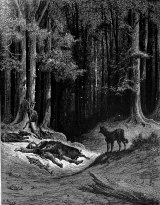The Wolf and the Hunter
"The Wolf and the Hunter" is a tale by Jean de La Fontaine that uses anthropomorphized characters to depict the complex relationship between a wolf and a hunter. The storyline masterfully demonstrates the cruelty and the inherent conflict in nature, as well as the struggle for survival. La Fontaine uses the story to explore deep philosophical and moral questions about the natural order of life.
Genre: Fable
Genre: Fable
- Year:
- 1668
- 13 Views
O Avarice! thou monster, mad for gain; Whose mind takes in but one idea of good! How often shall I use my words in vain? When shall my tales by thee be understood? Oh, when will man, with heart so cold, Still ever heaping gold on gold, Deaf to the bard as to the wise, At length from his dull drudgery rise, And learn how sagely to employ it,-- Or know, in plain truth, to enjoy it? Towards this course make haste, my friend, For human life has soon an end. And yet, again, a volume in one word compressing, I tell you, wealth is only, when enjoyed, a blessing. "Well," you reply, "to-morrow 'twill be done!" My friend, you may not see to-morrow's sun; Ah! like the Hunter and the Wolf, you'll find 'Tis hard to die, and leave your wealth behind. A Hunter, having deftly slain A Stag of ten, beheld a Doe; So, having taken aim again, Upon the green sward laid it low. This booty was sufficient quite For modest Hunter's appetite; But, lo! a Boar, of form superb, Starting from the tangled herb, Tempted the Archer's greed anew,-- The bow was twanged, the arrow flew,-- With futile shears the sister dread Had frayed his boarship's vital thread. Full grimly did she now resume The work at her Tartarean loom, Nor yet achieved the monsters doom. Not yet content?--nor ever will be he Who once has quaffed the cup of victory. The Boar has just begun to rise, When, swift, a red-legged partridge flies Right in the greedy Hunter's view,-- A wretched prize, 'tis very true, Compared with those already got: And yet the sportsman takes a shot; But ere the trigger's pulled, the Boar, Grown strong for just one effort more, The Hunter slays, and on him dies: With thanks, away the partridge flies. The covetous shall have the best; The miserly may take the rest.-- A Wolf that, passing by, took note Of this sad scene, said, "I devote To Mistress Luck a sumptuous fane. What! corpses four together slain? It seems scarce true! But I must be Prudent midst this satiety, For such good seldom comes to me." (This is, of many vain excuses, The one the miser mostly uses.) "Enough," the Wolf continued, "here, To give me for a month good cheer. Four bodies with four weeks will fit, But, nathless, I will wait a bit, And first this Hunter's bowstring chew, For scent proclaims it catgut true." Thus saying, on the bow he flings His hungry form; when, taking wings, The undischarged bolt quickly flies Through the Wolf's carcase, and he dies. And now my text I will repeat-- Wealth, only when enjoyed, is sweet. Oh, reader, from these gluttons twain Take warning, ere it be too late. Through greed was the keen Hunter slain; Through hoarding up Wolf met his fate.
Translation
Translate and read this book in other languages:
Select another language:
- - Select -
- 简体中文 (Chinese - Simplified)
- 繁體中文 (Chinese - Traditional)
- Español (Spanish)
- Esperanto (Esperanto)
- 日本語 (Japanese)
- Português (Portuguese)
- Deutsch (German)
- العربية (Arabic)
- Français (French)
- Русский (Russian)
- ಕನ್ನಡ (Kannada)
- 한국어 (Korean)
- עברית (Hebrew)
- Gaeilge (Irish)
- Українська (Ukrainian)
- اردو (Urdu)
- Magyar (Hungarian)
- मानक हिन्दी (Hindi)
- Indonesia (Indonesian)
- Italiano (Italian)
- தமிழ் (Tamil)
- Türkçe (Turkish)
- తెలుగు (Telugu)
- ภาษาไทย (Thai)
- Tiếng Việt (Vietnamese)
- Čeština (Czech)
- Polski (Polish)
- Bahasa Indonesia (Indonesian)
- Românește (Romanian)
- Nederlands (Dutch)
- Ελληνικά (Greek)
- Latinum (Latin)
- Svenska (Swedish)
- Dansk (Danish)
- Suomi (Finnish)
- فارسی (Persian)
- ייִדיש (Yiddish)
- հայերեն (Armenian)
- Norsk (Norwegian)
- English (English)
Citation
Use the citation below to add this book to your bibliography:
Style:MLAChicagoAPA
"The Wolf and the Hunter Books." Literature.com. STANDS4 LLC, 2024. Web. 30 Apr. 2024. <https://www.literature.com/book/the_wolf_and_the_hunter_2625>.




Discuss this The Wolf and the Hunter book with the community:
Report Comment
We're doing our best to make sure our content is useful, accurate and safe.
If by any chance you spot an inappropriate comment while navigating through our website please use this form to let us know, and we'll take care of it shortly.
Attachment
You need to be logged in to favorite.
Log In